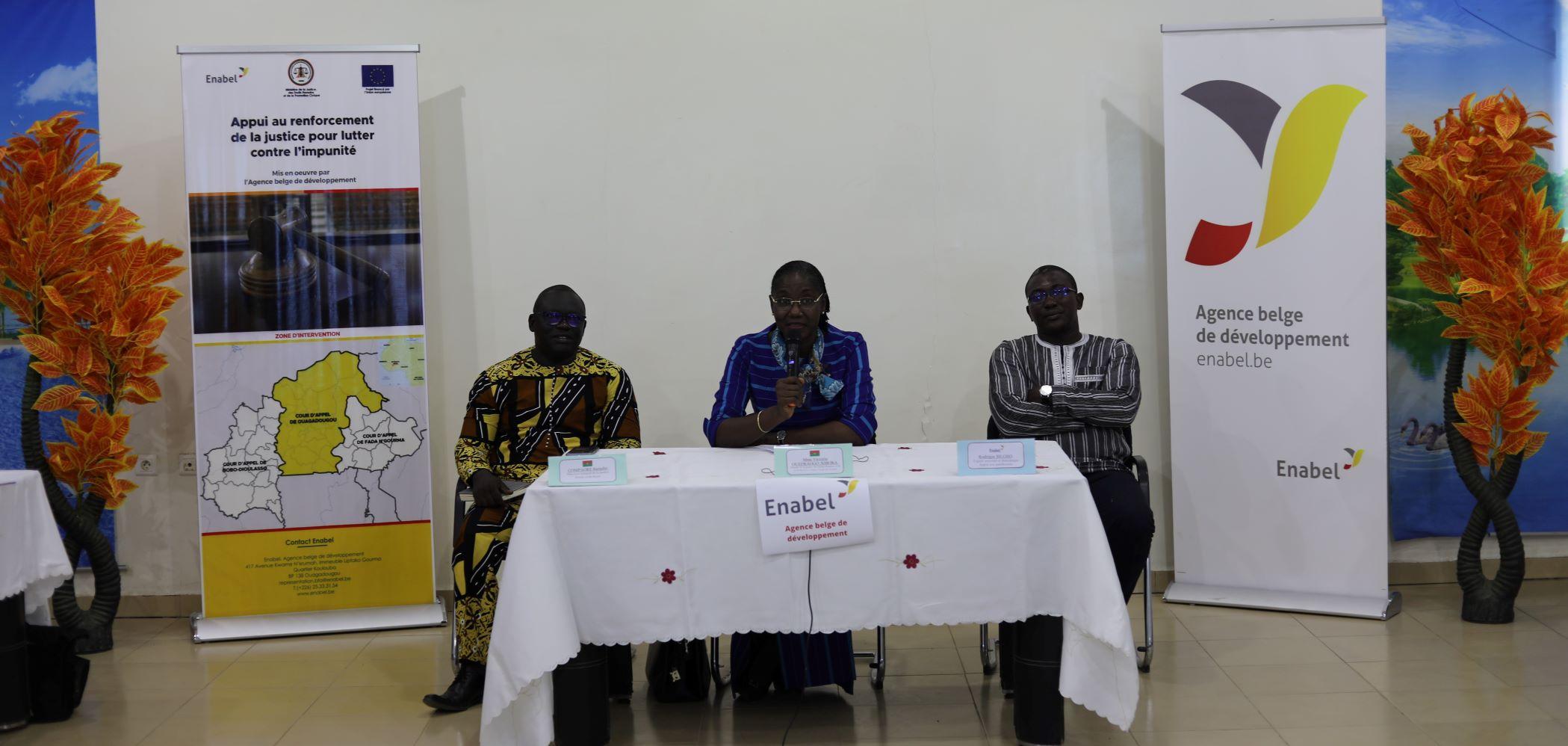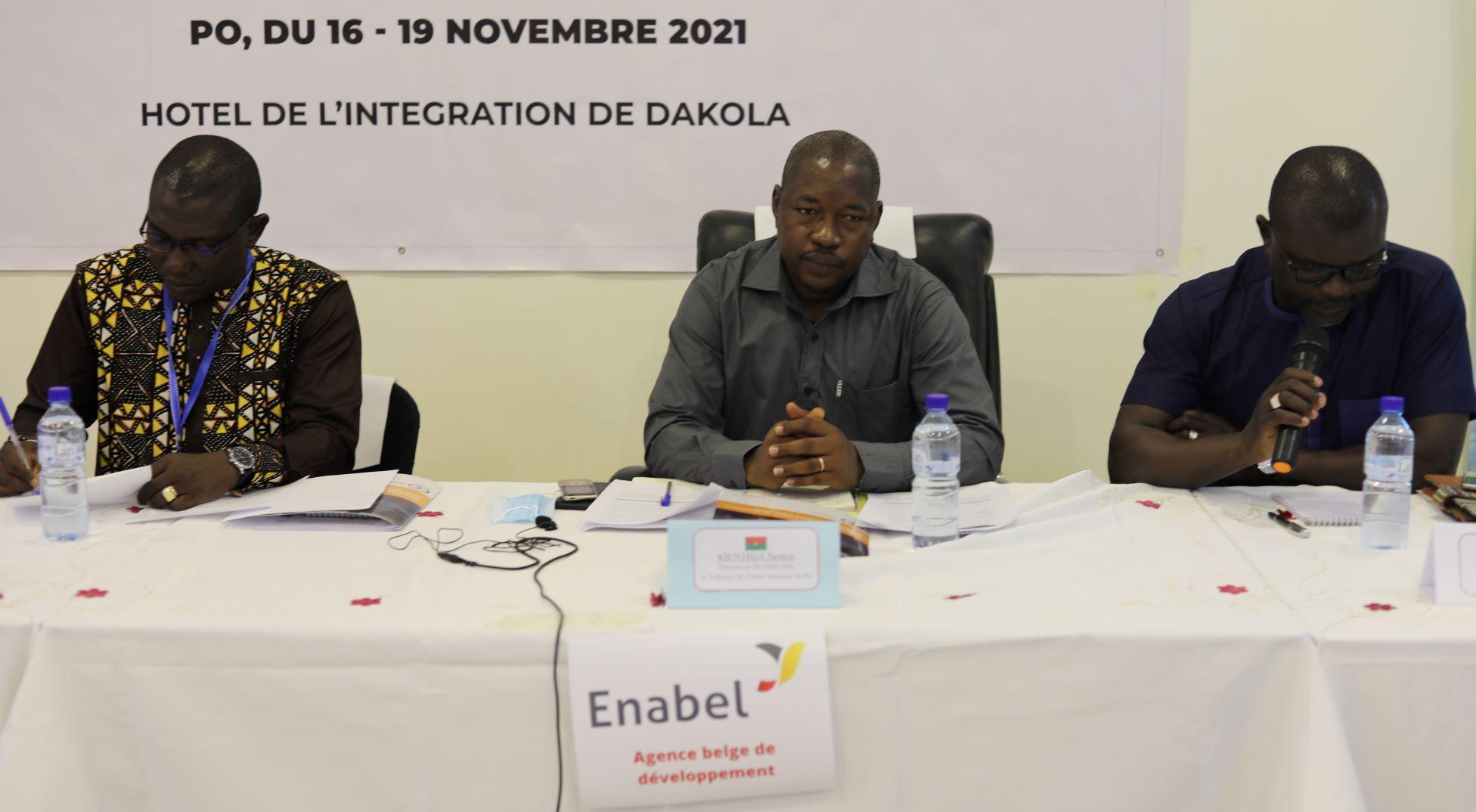Rechercher
Affichage de 1800 à 1815 sur 3125 actualités
-

Bénin: Malgré la crise Covid-19, de remarquables avancées pour le projet DEFIA!
Reece-hermine ADANWENON | 02/12/2021
Démarré depuis le 20 juin 2019, le projet de Développement de l’Entreprenariat dans la Filière Ananas « DEFIA » a connu sa revue à mi-parcours. Cette évaluation externe est orientée sur la redevabilité et sur la prise de décisions stratégiques. Elles apportent des réponses aux questions « comment » et « pourquoi » et sont indispensables à l’appréciation de la valeur des résultats atteints et de l’ensemble du processus de mise en œuvre du projet. Au terme de trois semaines de travail marquées par des échanges et visites aux bénéficiaires, acteurs et partenaires des projets-programmes intervenants dans la filière ananas, les évaluateurs ont présenté en présence des parties prenantes du projet les résultats de l’évaluation le vendredi 19 novembre 2021 à l’Infosec de Cotonou.Selon Hubert CATHALA, Responsable revue portefeuille et expert agriculture et Paul ONIBON, Expert Agriculture, les bénéficiaires et acteurs rencontrés reconnaissent la valeur ajoutée des interventions de l’Agence belge de développement « Enabel » dans le secteur agricole de manière générale et dans le développement de la filière ananas, de façon spécifique. L’équipe des évaluateurs a fait observer que malgré la crise sanitaire liée à la COVID19, le projet DEFIA après 2 ans de mise en œuvre a enregistré des avancées acceptables avec un taux de décaissement de (26%) et des engagements de (37%) un peu faible mais rattrapable. Avancées notables... Le Projet DEFIA du point de vue pertinence contribue à la mise en œuvre et à la réalisation des objectifs du Programme National de Développement de la Filière Ananas (PNDFA), l’approche « chaines de valeurs » et l’outil cluster agricole développés par le projet correspondent à des options stratégiques du Ministère de l’Agriculture, de l’Elevage et de la Pêche (MAEP), l’ananas est une des 7 filières à Haute Valeur Ajoutée désignées comme prioritaires par le gouvernement (Programme d’Actions du Gouvernement « Bénin Révélé ») et sa production est mise en œuvre par des producteurs familiaux et permet une activité de transformation artisanale. Plusieurs facteurs de blocage tels que l’accès des producteurs aux rejets d’ananas (en quantité et qualité) ou l’accès des agri-entrepreneurs de la filière au financement (subventions et prêt) ont été levés grâce à cette intervention. Par ailleurs, la promotion du numérique présente un potentiel d’appui à la structuration de la filière mais à ce stade du projet il demande encore à être développé et/ou consolidé. Du point de vue efficacité, 380.000 avec un bénéfice net de 700 000 FCFA/ha. On observe entre autres résultats: - Une augmentation des superficies d’ananas de 260 ha à Allada (1281 ha contre 1021 ha avant le projet) ; - Une augmentation du nombre d’agri-entrepreneurs (297 producteurs, 6 distributeurs) et une extension de la production dans de nouvelles zones (31 communes soit 5010 ha) ; - Le renforcement de 12 COPSA (sur 29 identifiés) avec la création d’activités rémunératrices pour 183 jeunes - 17 nouveaux contrats de ventes - Un début de structuration de la filière ananas - Une augmentation du nombre de cluster (16) et de leurs adhérents (et formalisation des échanges)- Le renforcement des Organisation Paysanne (OP) et OT - Un appui à la création et/ou la professionnalisation des Coopératives de Prestation de Services Agricoles (CoPSA) - Une meilleure régulation des prix - L’émergence de l’AIAB mise au crédit de DEFIA - Le renforcement des Agences Territoriales de Développement Agricole (ATDA). De même, l’amélioration des services de financement de l’entreprenariat dans la filière ananas est constatée avec : - L’augmentation du nombre d’acteurs de la filière accédant au crédit - La mise en place Centre de Promotion de la Micro Entreprise - Réseau National des Caisses Villageoise d’Epargne et de Crédit Autogérées du Bénin (CPME-Renaca) - Le renforcement des capacités des 6 Institutions de Micros Finances (IMF) partenaires - Le développement de 3 nouveaux produits financiers adaptés à la filière ananas ; fiches/formations sur la filière - L’élaboration et dépôt de 331 demandes de crédit : 166 dossiers financés par les IMF/Banques pour 870,2 millions don’t 243 millions pour les producteurs et 628 millions pour les transformateurs - Pour un financement total de la filière par les IMF/Banques : 1,9 milliards FCFA injectés pour plus de 2 489 agri-entrepreneurs don’t 2 370 producteurs pour 1,2 milliards FCFA, 38 transformateurs pour 674 millions FCFA, 81 commerçants/exportateurs pour 42 millions FCFA. On remarque la construction d’un mécanisme de garantie qui rassure et incite les IMF à faire désormais des crédits aux producteurs avec : - L’amélioration des plafonds de crédits - L’allongement de la durée des crédits (entre 18 et 36 mois) - Un mécanismes (de crédit et de garanties) perçus comme innovants et appréciés des acteurs de la filière. - L’accès au crédit facilité par les clusters - Le renforcement de la confiance dans la filière et la facilitation de l’accès au crédit par les partenariats avec les banques. A travers le FNDA, DEFIA a octroyé des subventions pour un montant total de 270 millions FCFA pour 7 agri-entrepreneurs auxquelles sont venus s’ajouter les contributions personnelles des agri-entrepreneurs de 312,5 millions FCFA et des crédits associés de 677 millions FCFA (soit un effet de levier : 3,68). Concernant l’efficience du projet DEFIA, Enabel est considérée par les bénéficiaires et acteurs du projet comme une institution pragmatique, à l’écoute, avec de bonnes capacités d’adaptation. Par ailleurs, les méthodes de travail employées minimisent les risques. La stratégie de pilotage (la délégation des travaux) à travers des partenaires locaux avec une forte expérience de la thématique (notamment à travers des conventions de subsides) est globalement efficiente. La mutualisation des moyens au sein du portefeuille est favorable (à priori) à l’efficience (mais vécue par certains comme une contrainte).
-
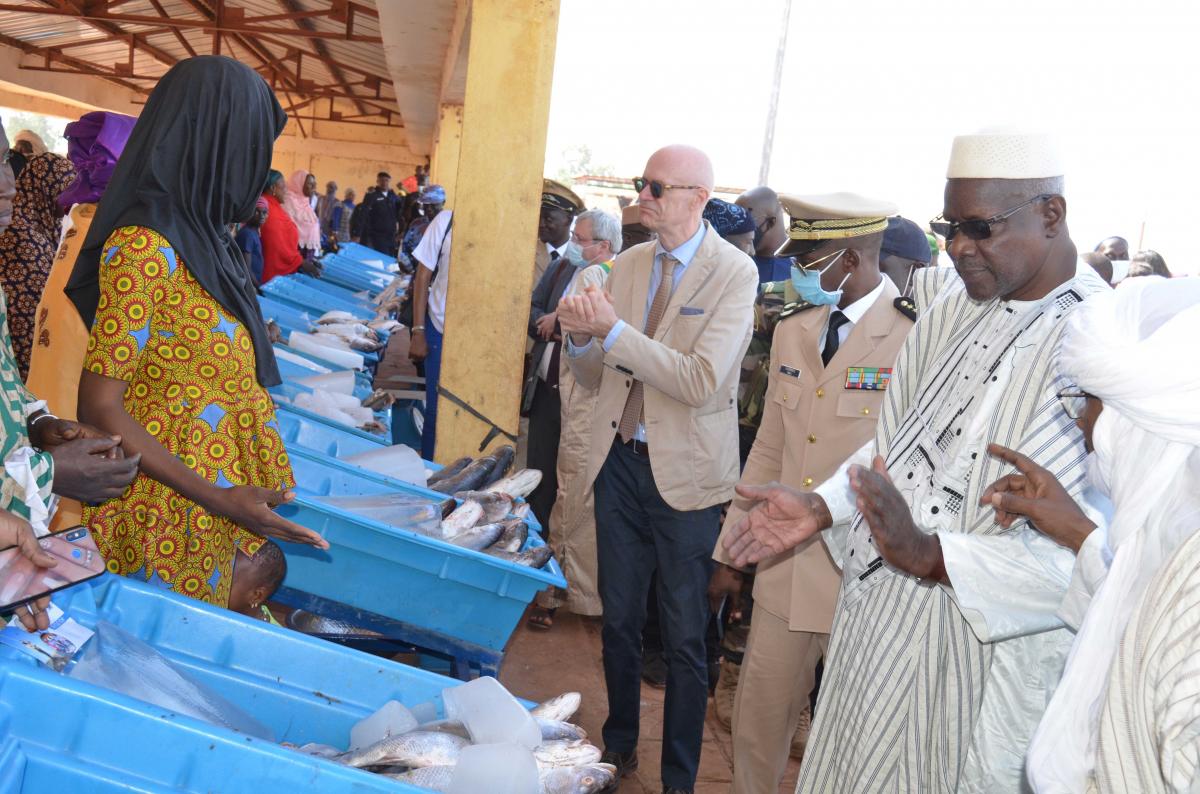
Mali: Le nouveau port de pêche de Mopti est opérationnel!
Nènè TRAORE | 02/12/2021
Le mardi 30 novembre 2021, le Ministre délégué chargé de l’Elevage et de la Pêche a inauguré le nouveau port de pêche de Mopti.Le Projet d’Appui à la Filière Halieutique au Mali (PAFHa+) a réhabilité et consolidé les aménagements du nouveau port. Le PAFHa+ est un projet de sécurité alimentaire et nutritionnelle cofinancé par l’Union européenne et l’Agence Française de Développement (AFD). Il est mis en œuvre par Enabel, l’Agence Belge de Développement. Mopti reste le premier site de débarquement et de commercialisation de poisson au Mali, plus de 6.400 tonnes de poisson frais sont commercialisées chaque année à Mopti. Pour faciliter ces opérations et améliorer l’hygiène et la qualité des produits halieutiques, le PAFHa+ s’est engagé dans la réalisation d’infrastructures et la fourniture d’équipement sur le site du nouveau port de pêche de Mopti. Le coût des travaux de finalisation et de consolidation des aménagements du nouveau port s’élève à 778 millions de FCFA. Etaient présents à la cérémonie d’inauguration l’Adjoint au Représentant Résident de Enabel au Mali , les ambassadeurs de l’Union Européenne, de la France et du royaume de Belgique au Mali. Le nouveau port de pêche de Mopti est bâti sur une superficie d’environ 3 ha, il dispose d’infrastructures et d’équipement modernes qui permettront d’améliorer les conditions de travail et les revenus des acteurs de la filière poisson à travers notamment : - La facilitation du débarquement des produits halieutiques ; - L’amélioration des systèmes de conservation, de transformation de poisson et de commercialisation du poisson ainsi que la réduction des pertes post capture ; - L’amélioration des conditions d’hygiène et d’assainissement du port grâce aux ouvrages de voirie et d’assainissement et un meilleur accès à l’eau potable ;-La sécurisation des personnes et des biens avec l’électrification et la clôture du site. Le nouveau port de pêche de Mopti contribuera d’une manière générale au développement économique régional à travers le développement des échanges commerciaux, la création d’emplois et la mobilisation des ressources financières.
-
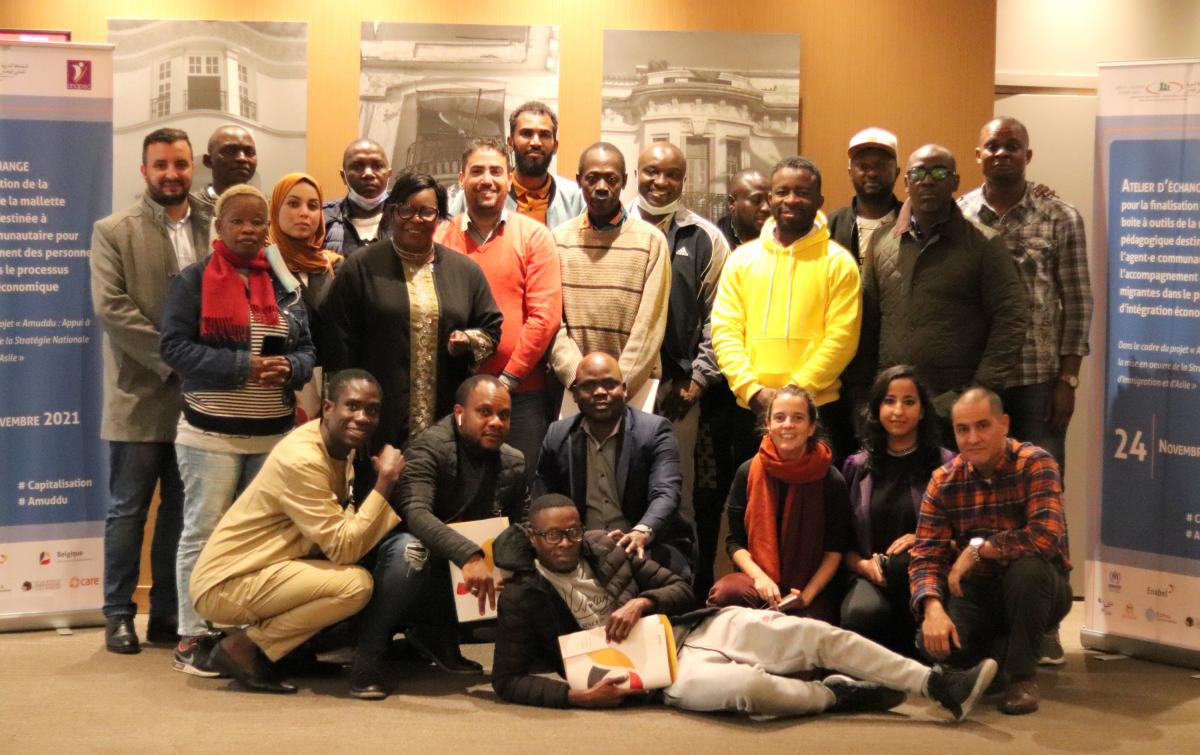
Maroc : Les agent.es communautaires du HCR et d’Enabel échangent sur les bonnes pratiques et les défis de leur métier
Clara HUYGHE | 01/12/2021
Dans l'optique de capitaliser sur les bonnes pratiques, le projet Amuddu a organisé un atelier d’échange avec des agent·es communautaires du Haut Commissariat des Nations unies pour les réfugiés (HCR) provenant de plusieurs régions du Maroc, ainsi qu’avec les quatre agent·es communautaires de l’intervention basés à Casablanca et Rabat. Cet atelier fait partie du processus de capitalisation lancé dans le cadre du projet Amuddu afin de systématiser la pratique communautaire testée au sein de l’intervention en partenariat avec l’Agence Nationale de Promotion de l'Emploi et des Compétences (ANAPEC). Pour cela, une mallette pédagogique sur l’approche communautaire pratiquée dans le domaine de l’intégration économique des migrant·es et réfugié·es est en cours d’élaboration. Dans ce sens, les échanges et discussions entretenus entre les agent·es communautaires lors de la rencontre avaient pour objectif d’enrichir la boite à outils qui fera partie de ladite mallette. L’atelier fut également l’occasion de créer un espace de partage où toutes et tous ont pu échanger sur les défis de leur travail, les techniques et méthodologies utilisées, ainsi que de potentielles pistes d’action pour la suite. Un atelier de concertation avait déjà été organisé par le projet en mars 2021 de concert avec les partenaires afin d’identifier les éléments stratégiques et opérationnels visant à faciliter l’adoption de l’approche communautaire par les entités concernées par l’accompagnement des personnes migrantes dans leur processus d’intégration économique. Ainsi, la mallette pédagogique élaborée au sein du projet se décline en deux volets : un guide destiné aux institutions publiques souhaitant implémenter ce processus de mobilisation communautaire et une « boite à outils » destinée aux futurs agent.es communautaires.
-
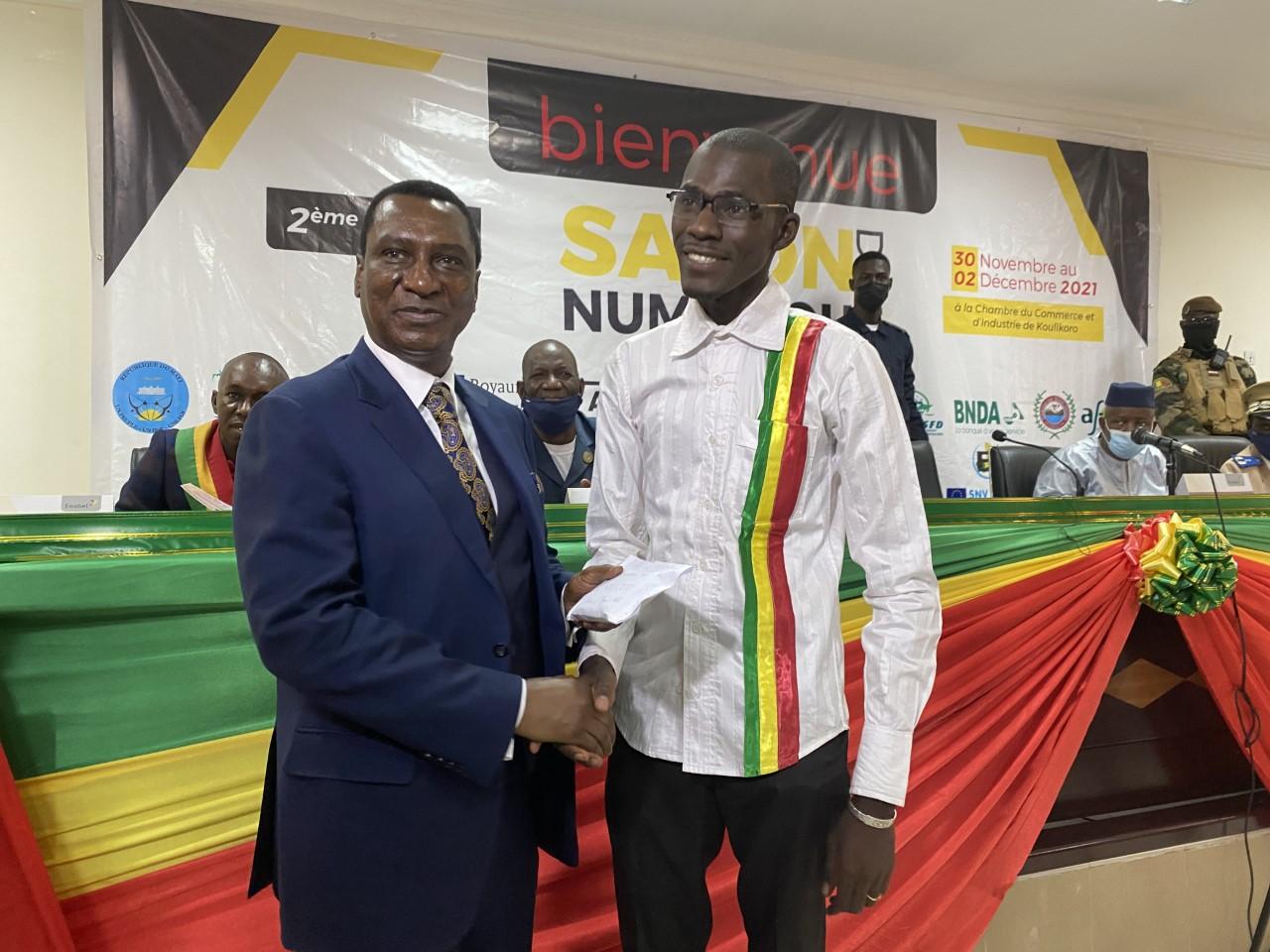
On vous emmène dans les coulisses de la 2ème édition du salon du numérique au Mali
Nènè TRAORE | 01/12/2021
Pour la deuxième année consécutive, Enabel au Mali à travers le projet de renforcement de capacité (IRC) a lancé la deuxième édition du salon du numérique.Prévu du 30 novembre au 2 Décembre 2021, la cérémonie d’ouverture a été présidée par le Ministre de la communication, de l'économie numérique et de la modernisation de l'administration accompagné de ses homologues du ministère de l'entrepreneuriat national et de la formation professionnelle et du développement rural. Le thème retenu pour cette édition est « les solutions et technologies du numérique, une opportunité pour l’accélération de la transformation de l’agriculture et des systèmes alimentaires au Mali ». Durant ces trois jours de nombreux acteurs du secteur économique de l’Agriculture, de l’Agroalimentaire, de l’Agro-industrie, des institutions étatiques, et des organismes de développement, des Startups et porteurs de solutions numériques ainsi qu’un public passionné et désireux de connaissances seront présents. L’innovation apportée pour cette seconde édition a été l’organisation d’un concours et Hackathon à l’endroit des startups et les demandeurs de solutions.La cérémonie d’ouverture a été mise à profit pour remettre le prix aux vainqueurs qui ont été départagés par un jury. Lors de la cérémonie d’ouverture, les autorités régionales ont affirmé que cette activité représente pour eux un événement important du fait qu'elle est une innovation pour eux. Quand au ministre de la communication, de l'économie numérique et de la modernisation de l'administration dans son discours d’ouverture s’est engagé à faire de Koulikoro la capitale du numérique suite aux acquis de Enabel dans la région en matière de digitalisation. Le conseil régional de Koulikoro a également profité de cette cérémonie pour décerner un certificat de reconnaissance à Enabel pour plusieurs points à savoir : L’institutionnalisation de la foire du numérique;La mise en œuvre du plan de formation du conseil régional de Koulikoro ;L’organisation d’une visite d’échange des élus de Koulikoro en Belgique sur la coopération décentralisée;L’appui à l’élaboration de projets de développement;La digitalisation du conseil régional de Koulikoro et la commune urbaine de Koulikoro. Durant ces trois jours, l’occasion sera donnée de participer à : -des échanges sur les produits et services numériques et digitaux pour une Agriculture inclusive et financière disponibles, via un espace d’exposition; -des débats ouverts sur le rôle et place du digital pour supporter la gestion de l’eau pour une agriculture durable ; -des communications sur des thématiques liées aux questions brulantes d’une Agriculture inclusive et sur des pratiques innovantes pour faciliter le financement de l’entreprenariat digital ; -des rencontres Business-to-Business (B2B) pour favoriser le contact direct entre l’offre et la demande en matière du numérique.
-
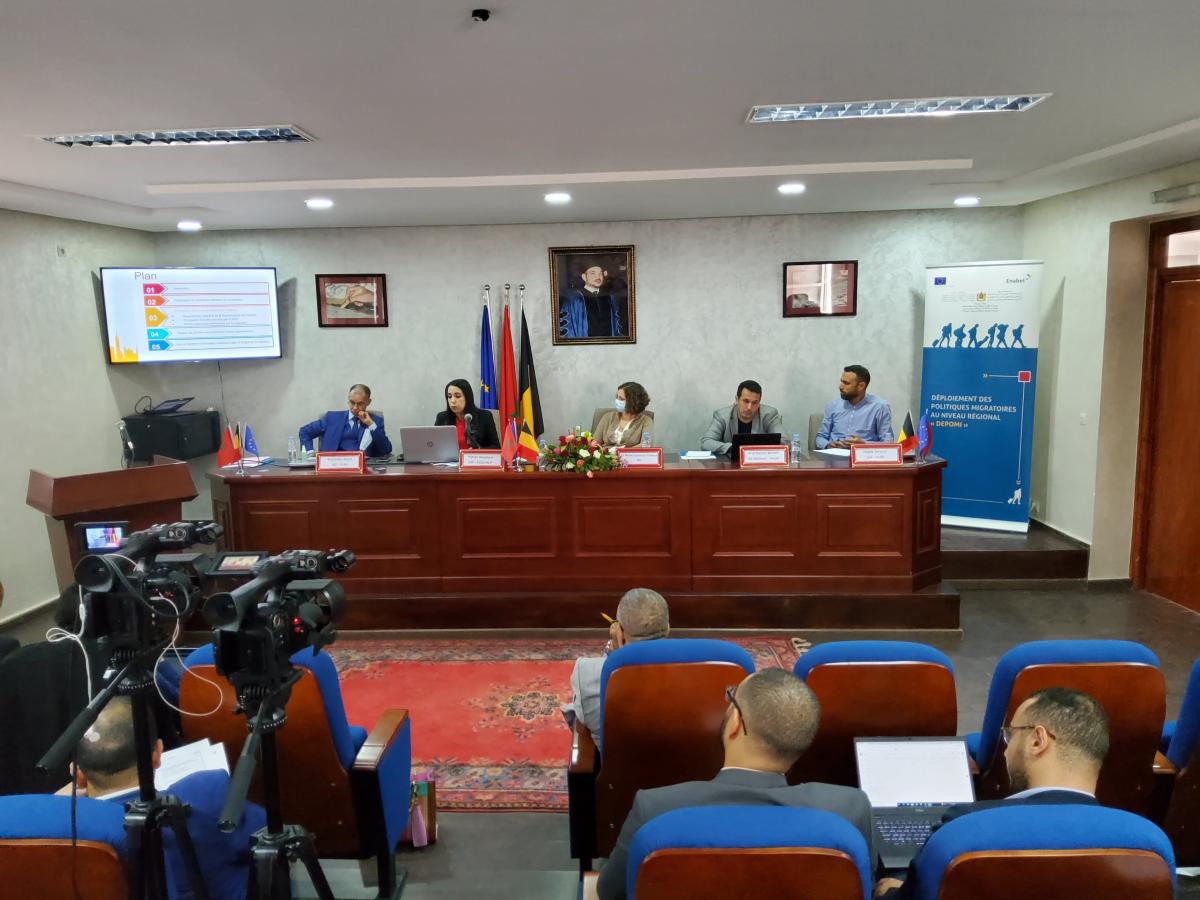
Au Maroc, a eu lieu la tenue d'ateliers de réflexion sur les migrations entre praticiens de la recherche et acteurs de l’action
Arturo BIGLIA | 30/11/2021
Les 8, 10 et 12 novembre 2021 avaient lieu des ateliers régionaux de réflexion sur les dynamiques migratoires et les enjeux de mise en œuvre de politiques publiques sur la migration respectivement dans les villes d’Agadir, Béni Mellal et Nador. Dans le cadre de sa composante recherche-action[1], DEPOMI, financé par l’Union européenne et mis en œuvre par Enabel, a une nouvelle fois mobilisé tous les acteurs clés de la migration autour de ces ateliers dans ses trois régions cibles du Souss-Massa, de Béni Mellal – Khénifra et de l’Oriental. Ces ateliers régionaux, organisés avec les soutiens logistique et substantiel des Universités Ibn Zohr (Agadir), Sultan Moulay Slimane (Béni Mellal) et Mohammed Premier (Oujda) ont notamment permis d’approfondir la connaissance du projet sur la littérature scientifique portant sur les dynamiques migratoires dans les trois région cibles, ainsi que de créer des liens durables entre les universités et centres de recherche européens et les universités marocaines. En outre, les ateliers ont également permis d’ouvrir le débat à tous les acteurs (non-académiques)[2] de la migration, protagonistes de l’action que la recherche vise à servir, et de mesurer leurs implications respectives. Chaque atelier régional était divisé en deux parties selon les deux thématiques de travail de la recherche-action que sont l’intégration des ressortissants étrangers et la mobilisation des Marocains résidant à l’étranger. Les premiers panels, sous forme académique, ont permis à des chercheurs, professeurs ou doctorants, de présenter l’état d’avancée de leurs travaux sur la migration. Les seconds, sous forme de dialogue participatif, ont permis aux acteurs de la région de présenter les actions de leurs institutions liées à la migration, ainsi que de mettre en avant leurs principales contraintes et priorités, telles que le manque d’accès aux données ou la structuration d’observatoires régionaux de la migration. Les différents débats ont notamment mis en lumière l’importance primordiale de la participation de tous les acteurs régionaux dans la gouvernance territorialisée de la migration. Accompagné par ses chercheurs associés du Centre d’Etudes de l’Ethnicité et de la Migration – CEDEM (Université de Liège) et de l’Institut de Recherche pour le Développement – IRD, chargés de l’analyse et de la restitution de ces ateliers, le projet DEPOMI visait notamment à affiner sa compréhension des dynamiques migratoires propres à chaque région. Plus concrètement, DEPOMI cherche à définir des questions thématiques prioritaires à traiter dans ces trois régions en fonction des besoins spécifiques de ces dernières. Ainsi, les prochaines étapes de la composante recherche-action, des ateliers thématiques et de formation, pourront être préparées selon les priorités identifiées dans les trois régions cibles. [1] Méthodologie de recherche scientifique qui accompagne le projet dans son appui à la régionalisation des politiques migratoires.[2] Liste non-exhaustive des acteurs régionaux présents : Conseils des régions, Wilayas, Centres régionaux d’Investissement, Haut-Commissariat au Plan (HCP), Cliniques juridiques, Associations de la société civile, Entraide nationale, Académie régionale d’Education et de Formation (AREF), Agence nationale de Promotion de l’Emploi et des Compétences (ANAPEC), Direction régionale de la santé.
-
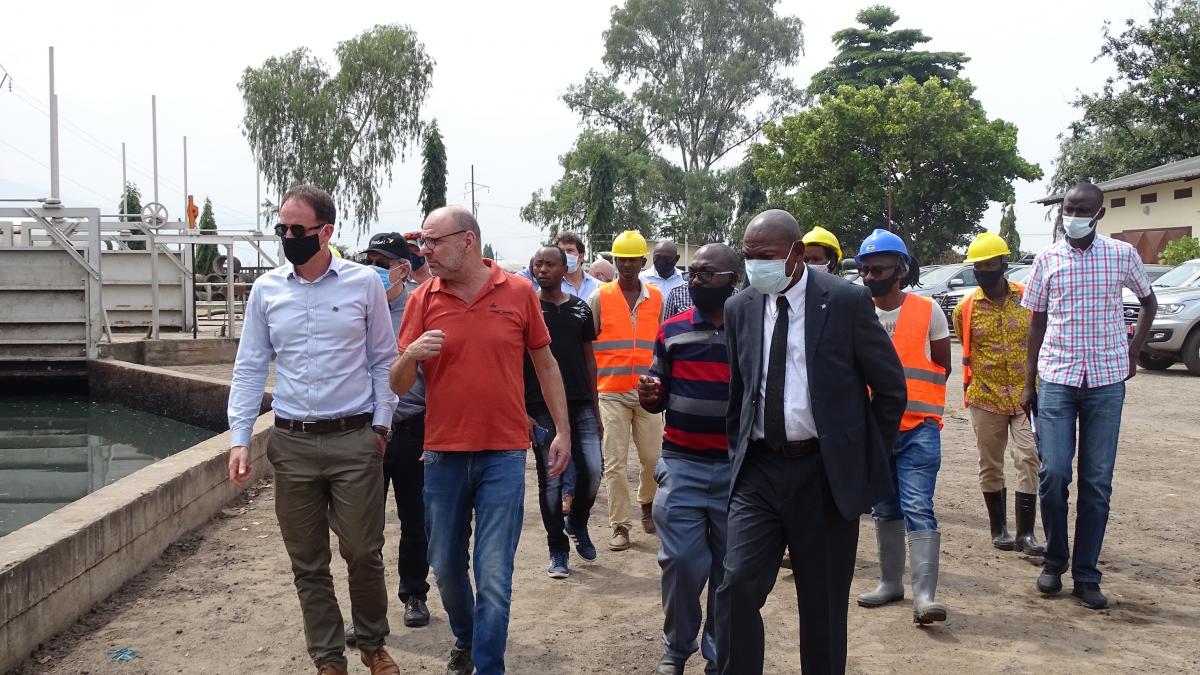
Jean Van Wetter, DG d'Enabel, visite le projet "Lake Tanganyika Water Management"
Rodrigue NIYONGABO | 30/11/2021
En visite de travail au Burundi, Jean Van Wetter, Directeur général de l’Agence Belge de Développement, Enabel a visité, ce 25 novembre 2021, le projet Lake Tanganyika Water Management, mis en œuvre conjointement par Enabel et l’Autorité du Lac Tanganyika sur financement de l’Union européenne. La visite a débuté par une rencontre à laquelle ont pris part le Représentant Résident de Enabel au Burundi, le Directeur exécutif de l’Autorité du Lac Tanganyika, la Délégation de l’UE, l’Intervention Manager du projet ainsi que l’équipe du projet LATAWAMA. Sylvain Tusanga, Directeur exécutif de l’Autorité du Lac Tanganyika, a remercié le Directeur général d’Enabel ainsi que toute la délégation pour la visite qui « témoigne de la bonne collaboration entre l’Autorité du Lac Tanganyika et l’Agence Belge de Développement ». Il se dit satisfait des réalisations du projet LATAWAMA et souhaite une continuité de la collaboration dans le cadre de la préservation des eaux du lac Tanganyika. Dans sa présentation, Didier Cadelli, Intervention Manager du projet est revenu sur les réalisations du projet dans toutes les zones d’intervention du projet et a rappelé l’importance de la surveillance environnementale du lac Tanganyika pour la mise en place de politique cohérente et efficace de protection des ressources en eau de la biodiversité. Dans la ville de Bujumbura, l’optimisation du fonctionnement de la station d’épuration des eaux usées de Buterere, la digitalisation du réseau de collecte des eaux usées, le renforcement des compétences sont les activités prioritaires de LATAWAMA. La délégation a ensuite visité le site de la station d’épuration de Buterere afin de visualiser les activités et travaux en cours. Jean Van Wetter a noté avec satisfaction l’état d’avancement des travaux : « Je me réjouis de l’avancement des travaux et je me rends compte de l’immensité et de la complexité du travail que nous espérons poursuivre avec différents partenaires dont l’Union européenne pour la continuité des efforts visant la protection du lac Tanganyika ». Cléophas BIZABISHAKA, Directeur de l’environnement, hygiène et assainissement au sein de L’Office Burundais de l’Urbanisme, de l’Habitat et de la Construction apprécie la collaboration avec Enabel et l’ALT et plaide pour une continuité de l’appui. Pour rappel, le projet LATAWAMA vise la préservation de la qualité des eaux du lac Tanganyika. Le traitement correct des eaux usées constitue un élément incontournable pour réduire la pollution du lac Tanganyika.
-

Bénin: Les violences faites aux femmes ne sont pas inévitables, elles sont inacceptables - VIDEO
Reece-hermine ADANWENON | 29/11/2021
Au Bénin, les Violences Basées sur le Genre (VBG) constituent un véritable fléau au regard de leur forte fréquence et des nombreuses conséquences auxquelles elles exposent les survivant(e)s. Selon les informations du Système Intégré des Données Relatives à la Famille, la Femmes et l’Enfant-Nouvelle Génération ( SIDoFFE-NG), 9 830 cas et 12 779 cas ont été enregistrés respectivement en 2019 et en 2020. Pour mettre fin à cette violence, Enabel intègre dans ses programmes, de manière tangible la lutte contre les différentes formes de violences faites aux femmes. A travers son Projet d’Appui à l’Opérationnalisation de la Police Républicaine (PAOP), elle œuvre pour une meilleure écoute des survivantes, s’attaque aux causes profondes de ces violences et contribue également à la redynamisation des services essentiels axés sur les survivantes dans les domaines de la police, de la justice, de la santé et des services sociaux. Découvrez dans cette vidéo les processus de prise en charge des survivantes au niveau des Centres Intégrés Départementaux de Coordination pour la Prise en Charge des Victimes et Survivantes des Violences Basées sur le Genre (CIPEC-VBG) et des Commissariats de Police. Pélagie Houndodjade Houndonougbo Epse Assogba, Assistante Sociale au CIPEC-VBG de Cotonou et Ismath Chabi, Commissaire de Police de 1ère Classe nous en parle.Selon Ismath Chabi, la 1ère porte de secours pour une victime est la Police Républicaine !
-
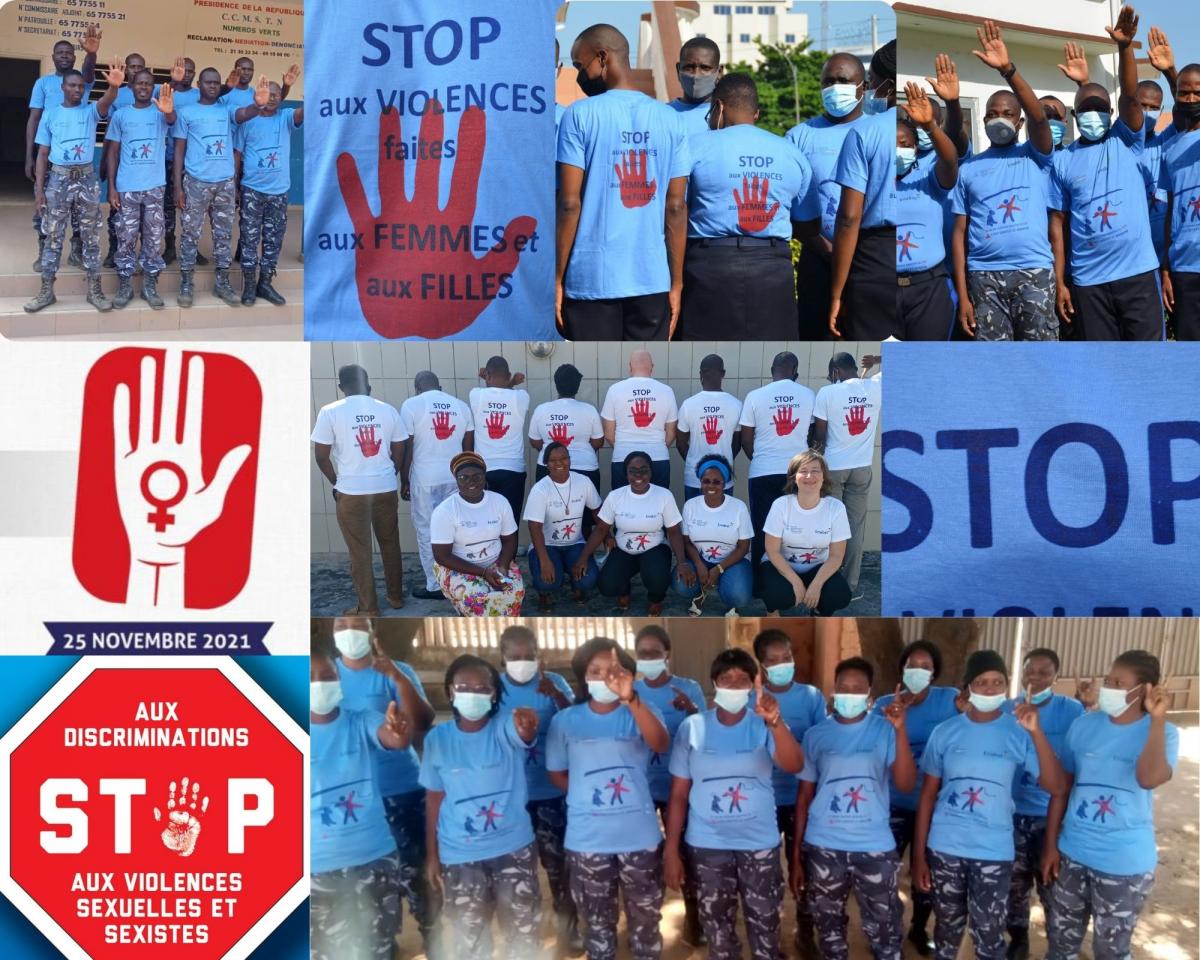
Au Bénin, organisation d'une campagne de sensibilisation auprès des forces de police sur les violences faite aux femmes
Reece-hermine ADANWENON | 26/11/2021
Des policiers et policières de Cotonou, Tchaourou et Parakou ont été mobilisés pour dire ensemble « Non aux violences faites aux femmes ». Ils s’engagent à jouer leur part pour : - Donner tout leur appui aux victimes de violences ; - Leur apporter assistance et secours;- Rétablir leurs droits. Cette campagne de sensibilisation organisée par le projet d’appui à l’opérationnalisation de la police républicaine (PAOP) s’étend sur les 16 jours d’activisme aux collèges et universités des trois zones pilotes du projet. STOP aux Violences fautes aux femmes. Appellez le 138 en cas de violence. Numéro anonyme et gratuit
-
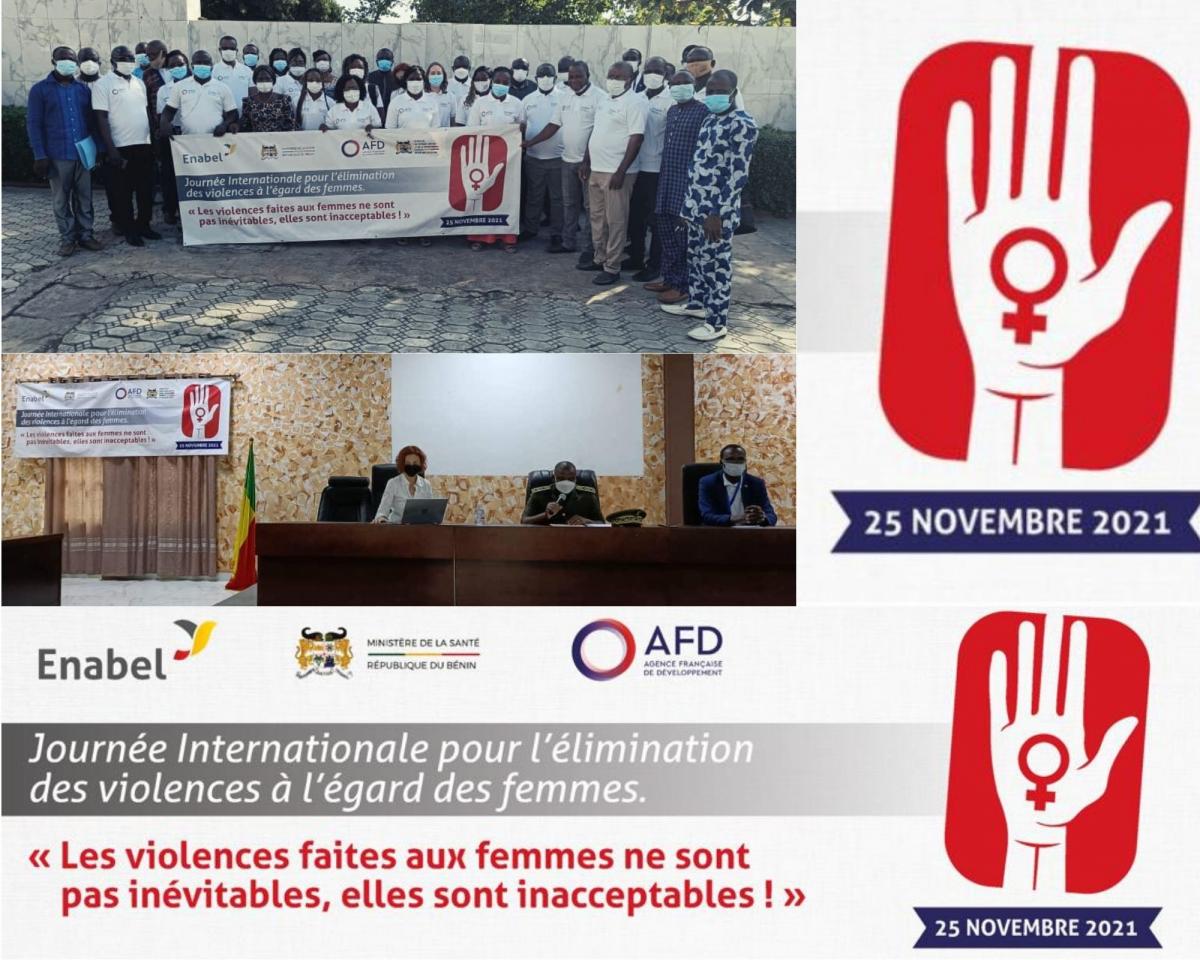
Lutte contre les violences faites aux femmes au Bénin: le Comité Départemental de coordination des interventions s’active !
Reece-hermine ADANWENON | 26/11/2021
L’hôtel Jeco de Dassa a servi de cadre le jeudi 25 Novembre 2021, pour la réunion du Comité Départemental de coordination des interventions en matière des Droits et Santé Sexuelle et Reproductive des Adolescent(e)s et Jeunes (SSRAJ) et des Violences Basées sur le Genre(VBG) dans les Collines. L'objectif de cette rencontre était de contribuer à l’amélioration de l’offre des services de la SDSRAJ, de la prévention et la prise en charge des VBG à travers l’analyse des indicateurs y relatifs et de renforcer la collaboration entre les parties prenantes. Les participants à cette rencontre ont : - passé en revue les avancées observée en matière de SDSRAJ et de prévention des VBG dans le département ; - définit une stratégie commune pour un plan d’action 2022. Mise en place avec l’appui technique et financier du Projet EQUITE, financé par l’Agence Française de Développement (AFD) et mis en œuvre par Enabel au Bénin, le Comité Départemental de Coordination des Interventions en matière de Droits et Santé Sexuelle et Reproductive des Adolescent(e)s et Jeunes (SSRAJ) et de lutte contre les VBG a pour, entre autres, missions de: -promouvoir la bonne santé sexuelle et reproductive des adolescent(e)s et jeunes dans les Collines, - coordonner et faire le suivi et évaluation de la mise en œuvre des interventions en SDSR et VBG, - collecter, analyser et présenter la synthèse des données factuelles, des propositions et des recommandations en matière de SDSR et VBG, - veiller à l’implication des adolescent(e)s ainsi que- faciliter la disponibilité des données désagrégées par sexe sur la SDSR et les VBG, - élaborer un rapport annuel sur les progrès en matière des SDSR et prévention des VBG dans le département des Collines- accompagner les jeunes dans la conception, planification et mise en œuvre des interventions en SDSR et VBG Il est composé entre autres du Préfet du Département, du Directeur Départemental de la Santé (DDS) des Collines ; du Directeur Départemental des Affaires Sociales et de la Microfinance (DDASM) des Collines, des Procureurs de la République près le Tribunal de Première Instance de deuxième classe de Dassa, Tribunal de Première Instance de deuxième classe de Savalou, Tibunal de Première Instance de deuxième classe d’Abomey, du Directeur Départemental de la Police Républicaine (DDPR) des Collines, des Directeurs Départementaux des ministères sectoriels tels que le Plan et du Développement, des Enseignements Secondaire, Technique et de la Formation Professionnelle, des Enseignements Maternel et Primaire (DDEMP) et autres directions techniques et centraux concernés. Les Violences Basées sur le Genre (VBG) sont un phénomène prévalent dans toutes les localités du département des Collines. Selon les statistiques du Système Intégré des Données relatives à la Famille, la Femme et l’Enfant-Nouvelle Génération (SIDoFFE-NG) , parmi les formes de VBG prévalentes dans les Collines figurent les violences sexuelles, violences patrimoniales ou culturelles, enlèvement et séquestration, harcèlement, violences économiques, incestes, violences physiques, violences psychologiques, grossesses précoces, maltraitance, viol, mariage forcé, mariage des mineures et mutilations génitales féminines.
-
Au Burkina Faso, la Garde des Sceaux rend visite aux acteurs de la chaine pénale du Tribunal de Grande Instance (TGI) !
Kimsegninga SAVADOGO | 26/11/2021
Madame Victoria KIBORA / OUEDRAOGO, Ministre de la Justice, des Droits Humains et de la Promotion Civique, Garde des Sceaux a rendu une visite d’encouragement aux acteurs de la chaine pénale du Tribunal de Grande Instance (TGI) de Pô le jeudi 18 novembre 2021 réunis en atelier de concertation du 16 au 19 novembre 2021 à Dakola, localité située à une vingtaine de kilomètres de la ville de Pô, dans la région du Centre Sud. Elle a salué l’initiative de cette rencontre, deuxième du genre après celle de Koudougou début novembre 2021, qui est le fruit d’un partenariat entre Enabel et son département ministériel. En effet, Enabel, à travers le Projet d’appui au renforcement de la justice pour lutter contre l’impunité (PARJI), financé par l’Union européenne, soutient les juridictions du ressort de la Cour d’Appel de Ouagadougou dans la réalisation de certaines activités visant à améliorer le fonctionnement de la chaine pénale Ce jeudi 18 novembre, troisième jour de l’atelier, Madame Victoria KIBORA / OUEDRAOGO a fait son entrée dans la salle qui réunissait le Procureur du Faso près le TGI de Pô et ses Officiers de Police Judiciaire (OPJ). Sa présence se justifiait par sa volonté d’encourager les acteurs de la chaine pénale du TGI de Pô et de remercier Enabel qui, à travers le PARJI, soutient la réalisation de cet évènement. Elle est heureuse de voir que tous ceux qui interviennent dans la chaine pénale puissent se rencontrer, se parler et se comprendre. « Parce qu’à chaque niveau de la chaine, le maillon que vous êtes, devez parler le même langage pour que le travail soit de qualité, afin que les juridictions aussi puissent atteindre leurs objectifs. C’est pourquoi j’encourage ce type de cadre » affirme-t-elle. « Il y a beaucoup d’informations, je suis sûre, que vous avez pu avoir, depuis votre présence à cet atelier, et qui vous seront utiles dans le cadre de votre travail », se rassure-t-elle. Pour sa part, Madame Victoria KIBORA / OUEDRAOGO attend des recommandations à l’endroit de son ministère avant d’envisager une implication plus concrète de son département afin de contribuer à l’efficacité de la chaine pénale. Geoffroy ZONGO Chargé de communication / GP
-
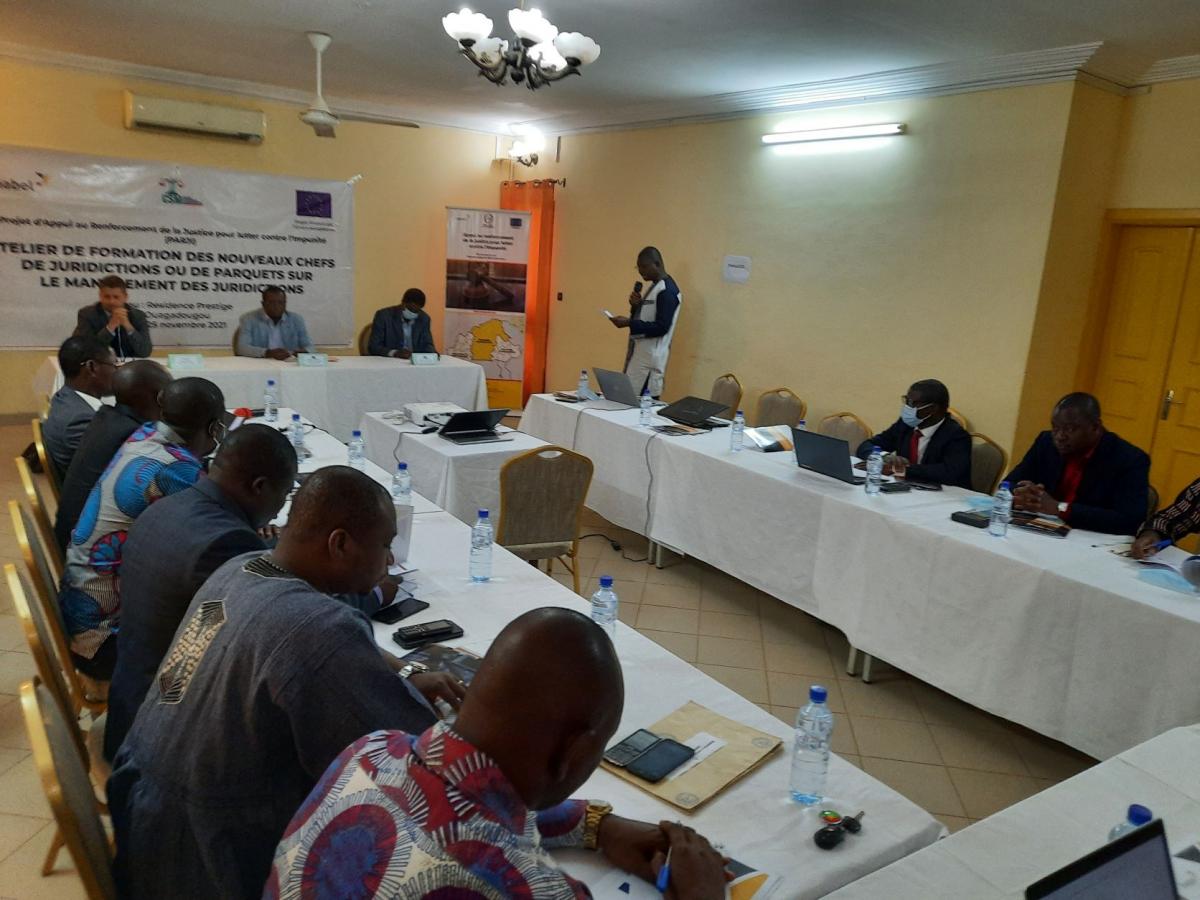
A Ougadougou, Enabel appuie une formation de magistrats sur le management des juridictions
Kimsegninga SAVADOGO | 26/11/2021
En collaboration avec le Conseil Supérieur de la Magistrature (CSM), Enabel à travers son appui au renforcement de la justice pour lutter contre l’impunité au Burkina Faso (PARJI) a organisé le lundi 22 novembre 2021 à Ouagadougou, une session de formation sur le management des juridictions au profit des chefs de juridictions ou de parquets nouvellement nommés. Présidée par le Secrétaire permanent par intérim du CSM, M. Paulin BAMBARA, l’ouverture de l’atelier a connu la participation effective du Représentant Résident d’Enabel au Burkina Faso M. Olivier KRINS qui, dans son intervention lors de la session, a réaffirmé l’engagement et la volonté d’Enabel et de la Belgique de s’inscrire dans des initiatives européennes pour soutenir le Burkina Faso dans la recherche de solutions aux préoccupations des populations dans le domaine judiciaire. Il a, par ailleurs, ajouté que c’était dans cette logique que s’inscrivait la mise en œuvre du PARJI financé par l’Union européenne jusqu’en 2024 à hauteur de près de 4 millions d’euros dans l’objectif de renforcer l’accès à la justice à travers le renforcement des capacités des acteurs judiciaires en vue de leur permettre d’exercer au mieux les missions qui leur sont confiées. En effet, le PARJI vise à renforcer l’offre et la demande de justice au Burkina Faso en améliorant la chaine pénale pour un meilleur accès des populations à la justice. Le projet travaille à réduire les disfonctionnements de la chaine pénale, à développer dans le domaine judiciaire une méthode de gestion axée sur les résultats afin de renforcer la productivité des juridictions et de contribuer à répondre, au mieux, aux besoins des justiciables. En substance, dira Olivier KRINS, « aujourd’hui, il est nécessaire d’avoir à la tête des juridictions et des parquets, de véritables magistrats-managers suffisamment outillés pour coordonner l’activité juridictionnelle, en mesurer l’efficacité, fixer les objectifs à atteindre, prévoir les moyens à mettre en œuvre dans une démarche claire et adaptée au contexte ». C’est fort de cette conviction qu’Enabel accompagne cette initiative de formation, proposée par le CSM, structure avec laquelle elle entretient un partenariat qui s’inscrit dans la durée et qui prévoit la mobilisation de l’expertise belge de l’Institut de formation judiciaire pour des formations pratiques sur des thématiques spécifiques en rapport avec la justice et les droits humains. Kimségninga SAVADOGO Communication Officer / Représentation
-
Au Burkina Faso, Enabel soutient le nouveau tribunal de grande instance de Pô via le projet PARJI
Kimsegninga SAVADOGO | 26/11/2021
Un atelier de concertation entre les acteurs de la chaine pénale du Tribunal de Grande Instance (TGI) de Pô se tient du 16 au 19 novembre 2021 à Dakola. Ce cadre de concertation est une initiative du Procureur du Faso près le TGI de Pô. Cette initiative est soutenue par l’Agence belge de développement (Enabel) à travers le Projet d’appui au renforcement de la justice pour lutter contre l’impunité (PARJI), financé par l’Union européenne. La cérémonie d’ouverture de l’atelier a été présidée par Monsieur DALA Emile Fidèle C., Représentant le Directeur Général de la Justice pénale et du Sceau du MJDHPC. Il avait à ses côtés Monsieur Nestor KIENTGA, Procureur du Faso près le TGI de Pô, de Monsieur Valentin KABORE, Directeur Provincial de la Police nationale du Nahouri, du Lieutenant Boukary DRABO, Commandant de la compagnie de Gendarmerie nationale de Pô et de Monsieur Rodrigue BILGHO, Expert sectoriel et thématique en appui aux juridictions pour Enabel pour le compte du PARJI. L’objectif général de l’atelier est d’offrir un cadre de dialogue du Directeur de la Police Judiciaire qui est le Procureur du Faso près le TGI de Pô, avec ses officiers et agents de police judiciaire, de décliner les orientations de la politique judiciaire pénale, de recueillir des préoccupations et des suggestions de leur part, d’adopter un projet d’institutionnalisation d’un cadre périodique de rencontre et un plan d’action pour l’année judiciaire 2021-2022. Durant les quatre jours de travaux, des mesures pour un bon fonctionnement de la chaine pénale seront soumises à discussion par les participants, des solutions pour une bonne collaboration entre les juges d’instruction et la Police Judiciaire seront identifiées et un partage de bonnes pratiques dans la conduite des enquêtes préliminaires sera réalisé entre le Procureur du Faso près le TGI de Pô et ses OPJ. Ceux-ci seront notamment sensibilisés sur les innovations du Code de Procédure Pénale et du Code Pénal et sur la médecine légale. Aussi, des échanges entre les acteurs de la chaine pénale et les compagnies de téléphonie mobile leur permettront de prendre des mesures adéquates pour améliorer l’exécution des réquisitions adressées aux compagnies de téléphonie. Parmi les participants figurent également des acteurs de la société civile comme le Mouvement burkinabè des droits de l’homme et des peuples (MBDHP) – section Nahouri et l’Union provinciale des femmes du Nahouri. La présence de la société civile permettra de tenir des échanges sur les problématiques spécifiques d’accueil et de prise en charge des victimes et témoins en matière pénale. Cette activité qui est la toute première du TGI de Pô a été particulièrement appréciée par le Procureur du Faso, Monsieur Nestor KIENTEGA compte tenu de l’ouverture récente du TGI, le 16 septembre 2021. « C’est l’occasion pour moi de pouvoir asseoir une dynamique, une bonne politique qui puissent me conduire à une bonne administration de la justice, parce que j’ai l’avantage de pouvoir anticiper sur les difficultés », se réjouit-il. L’appui d’Enabel à travers le PARJI pour la réalisation de cet atelier de concertation entre les acteurs de la chaine pénale du TGI de Pô est vivement salué par les participants, qui, du reste souhaitent, par la même occasion, une continuité de l’appui d’Enabel pour la réussite d’autres activités entrant dans le cadre des missions de Police Judiciaire. Geoffroy ZONGO Communication Officer / GP
-
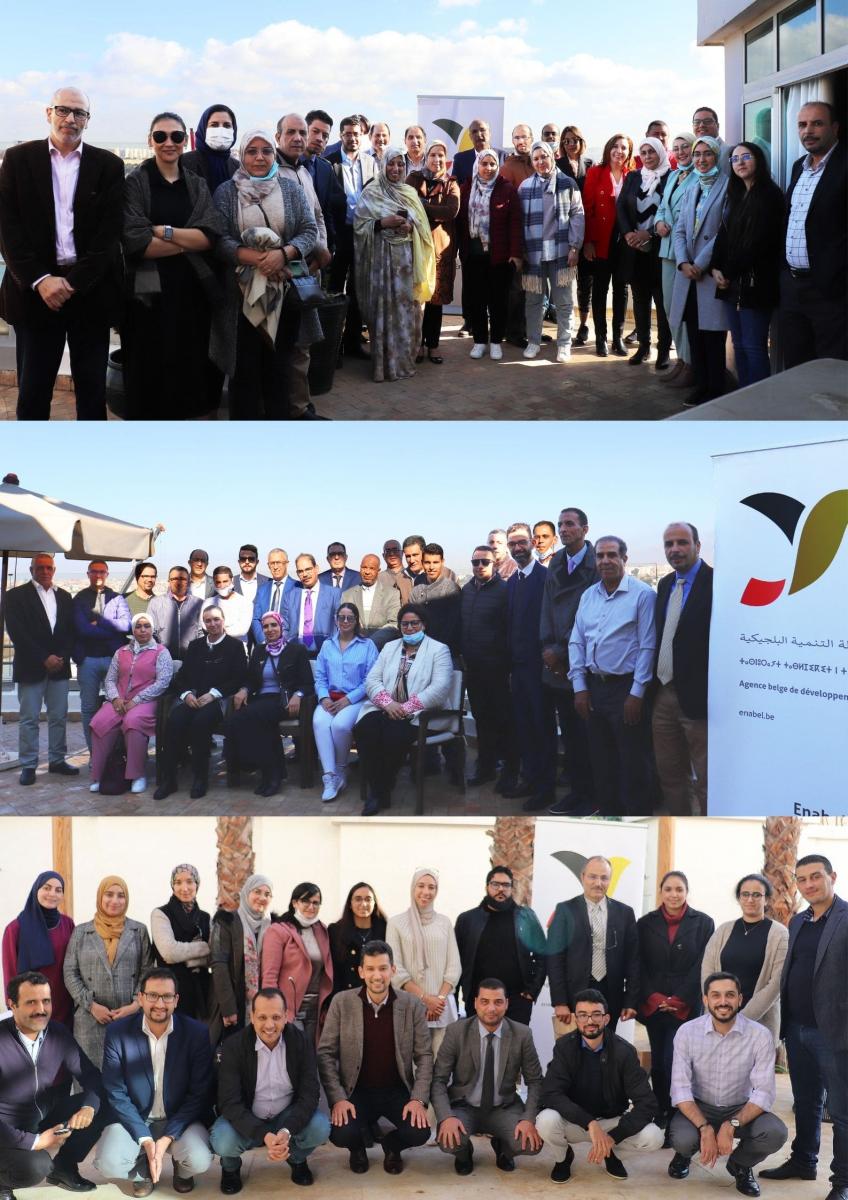
Maroc : e-TAMKEEN lance officiellement ses plans de renforcement des compétences de l'Administration publique
Bénédicte BAZYN | 24/11/2021
Le 15 novembre a marqué le lancement des Plans de Renforcement des Compétences du programme e-TAMKEEN. Trois premières sessions de formations ont été dispensées à destination de 78 fonctionnaires de l’Administration publique basés à Rabat et dans les régions. Ces modules sont les premiers d’une longue série qui sera déployée jusque mars 2023. C’est officiel, depuis le 15 novembre 2021, e-TAMKEEN a lancé les premières formations de ses Plans de Renforcement des Compétences. Ces plans, établis en accord avec les 15 Ministères et Départements bénéficiaires, sont le cœur du programme qui vise à soutenir les fonctionnaires de l’Administration publique marocaine dans la numérisation de leurs services. Pour ce faire, ils toucheront des thématiques larges et variées telles que la sensibilisation et la gestion de la transformation digitale, l’innovation au sein de celle-ci mais aussi les risques et éthiques liés au digital. Des modules seront en outre consacrés à l’utilisation concrète et technique des outils phares de la digitalisation et de l’e-learning. Cette première semaine a déjà réuni 78 fonctionnaires dans le cadre de trois sessions sur la communication digitale et l’e-réputation, le management de l’innovation au sein des Administrations publiques et les nouvelles méthodes de gestion de projets numériques. Les participants venaient aussi bien de départements centraux que du niveau local. Ainsi, de nombreux secteurs et régions étaient représentés pour ce kick-off de haut vol. Ces modules sont donc les premiers d’une longue série de formations qui sera organisée sous formats divers et qui s’étendra jusqu’au mois de mars 2023. L’équipe d’e-TAMKEEN s’assurera de donner à l’ensemble de ces sessions une qualité exemplaire de sorte de satisfaire au mieux les besoins exprimés par l’ensemble des bénéficiaires du programme.
-
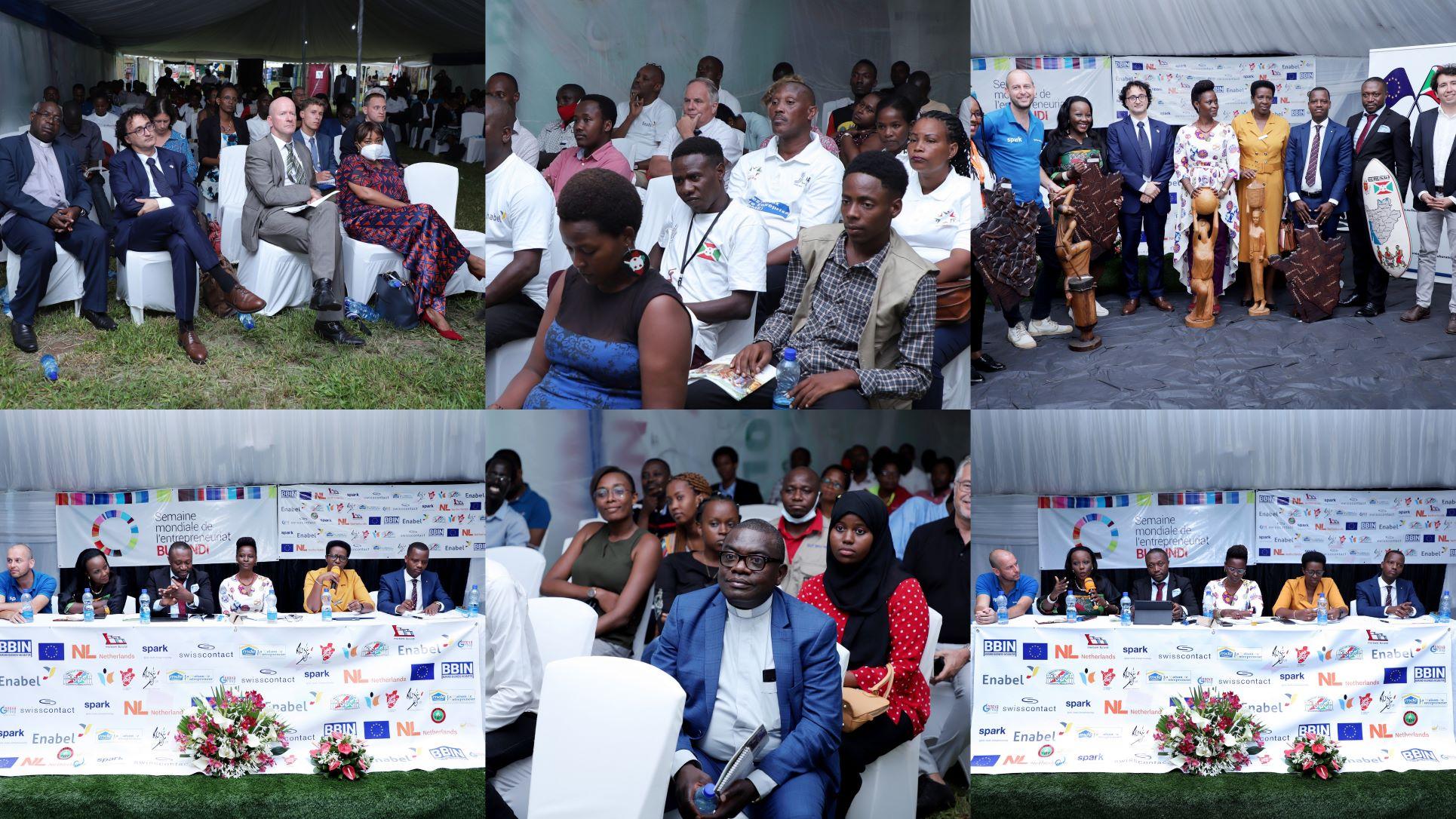
Esprit d’entreprendre et jeunesse: un duo gagnant au Burundi!
Donavine KWIZERA | 23/11/2021
La célébration de la semaine mondiale de l’entrepreneuriat (SME) au Burundi a été marquée par plusieurs activités des institutions organisatrices, ainsi un panel de haut niveau a été coorganisé par Enabel et la Délégation de l’Union Européenne (DUE) au Burundi dans l’après-midi du 16 novembre sous le thème « Favoriser l’entrepreneuriat des jeunes au Burundi » avec des panelistes ayant de l’expertise et pouvant enrichir et faire avancer le débat de l’entrepreneuriat des jeunes. Dans le cadre du renforcement du partenariat entre le secteur public et privé, l’objectif du Panel était de répondre aux besoins, aux préoccupations et aux questions exprimés par les jeunes, à partir d’une vidéo synthétisant les besoins des apprenants des centres d’enseignement des métiers (CEM) appuyés par le projet ACFPT. Après l’ouverture du panel par l’Ambassadeur de Belgique au Burundi, la modératrice a procédé à l’introduction et la présentation des six panelistes qui sont des acteurs qui jouent chacun un rôle important dans l’écosysteme entrepreneurial au Burundi, ils venaient du secteur public (Banque d’Investissement des jeunes), du secteur privé (CFCIB, Kazoza’Art, Hope Design), du secteur financier (CECM), et des ONG appuyant l’entrepreneuriat (Spark). Ce débat a été orienté autour des idées exprimées par les apprenants et lauréats des CEM dans une vidéo en termes de besoins et d’appuis.Le panel se focalisait sur la promotion d’une nouvelle réflexion sur l’entrepreneuriat des jeunes et ce qui pourrait être un environnement favorable pour cela. Les échanges ont été fructueux autour de l’esprit entrepreneurial des jeunes, l’accès aux ressources et aux capitaux, l’avantage de se mettre ensemble pour créer des entreprises, les avantages, contraintes et risques liés au crédit. Une attention particulière a été portée sur l’intérêt d’apporter un soutien technique aux entreprises naissantes ou appuyer la croissance de celle déjà existantes. Il est intéressant de noter que "favoriser l’emploi des jeunes et l’entrepreneuriat" fait partie de l’une des trois dimensions prioritaires de la Stratégie de l’UNESCO pour l’enseignement et la formation technique et professionnelle (2016-2021). L’objectif sous-jacent de telles activités est aussi d’atteindre plus de coopération et de coordination entre les différents acteurs locaux et internationaux, et de centrer les initiatives sur les idées et besoins des jeunes.
-
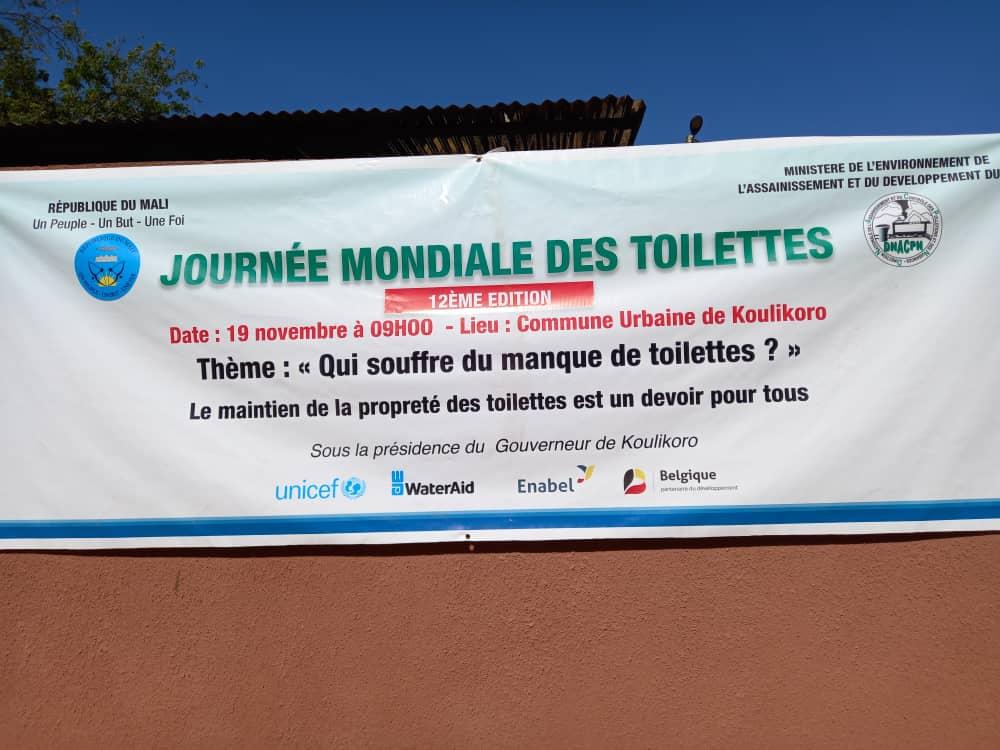
Au Mali, nos collaborateurs ont célébré la journée mondiale des toilettes et inauguré de nouvelles latrines!
Nènè TRAORE | 20/11/2021
A travers son Projet d’amélioration de l’accès à l’eau potable et à l’assainissement (PEPAK), Enabel a participé à la célébration de la journée mondiale des toilettes ce vendredi 19 Novembre 2021. Cette journée vise à sensibiliser le public sur le rôle crucial que jouent les toilettes pour les populations et à encourager des actions ciblées pour relever le défi de la crise mondiale de l'assainissement. Cette année le Mali est à sa douzième édition de la Journée Mondiale des Toilettes (JMT) dont le thème national est : « Qui souffre du manque de toilettes ?». Dans le but de contribuer à l’amélioration du niveau de connaissance des populations sur les dangers liés au manque d’accès aux toilettes, mais aussi les effets néfastes de la Défécation à l’Air Libre (DAL), le Projet d’amélioration de l’accès à l’eau potable et assainissement a mené des activités de sensibilisation durant la JMT. A Bamako, nous avons pris part à la cérémonie de lancement de cette journée en présence du ministre de l’environnement, de l’assainissement et l’ambassadeur dur royaume de Belgique au Mali. Lors de la cérémonie d’ouverture, l’ambassadeur, au nom des partenaires actifs dans le secteur de l'environnement au Mali, s'est engagé à soutenir pleinement l'amélioration des infrastructures sanitaires dans le pays ; non seulement dans les foyers, mais aussi dans les écoles et les établissements de santé. A Koulikoro, nous avons profité de cette journée pour faire la remise officielle des clés des latrines réalisées au niveau de la mairie et de la préfecture aux autorités respectives.
